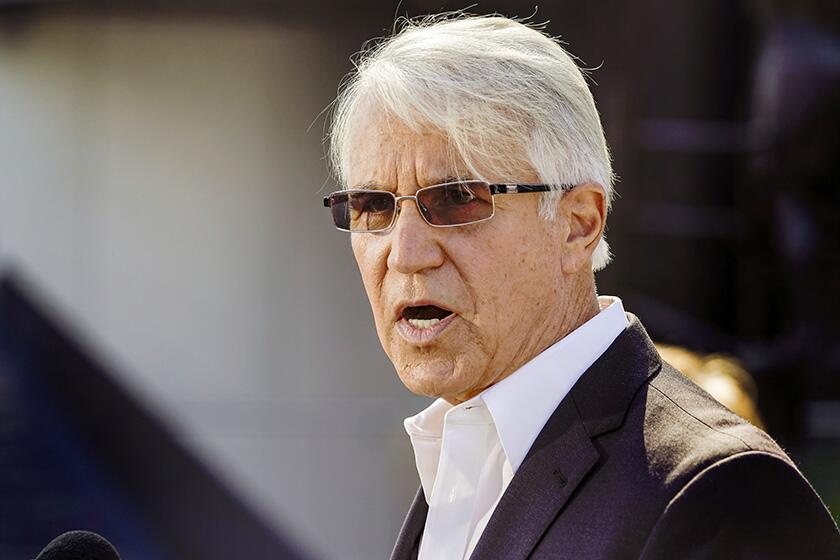Gorbachevs heir
One year ago this month I found myself in the unusual position of hosting lunch for Mikhail Gorbachev. It was a work meeting at the L.A. Times, not some kind of rubber-chicken tribute (the former Soviet president was in town to talk up his Green Cross environmental initiatives), but there was something personally chilling about staring into the eyes of a man whose military shot and bludgeoned to death 13 peaceful Lithuanian protesters a full 14 months after the Berlin Wall fell, at a time when I was living in a country (Czechoslovakia) still occupied by tens of thousands of Red Army troops.
Things at lunch were amicable until I asked the former Pizza Hut pitchman whether he thought there was anything factual behind the persistent reporting in the west that Russian President Vladimir Putin has been backsliding away from democracy. Gorbachev’s smile disappeared, his eyes narrowed to lumps of burning coal, and for the next 10 minutes or so he barked out an angry lecture defending Putin and savaging the United States for working actively to humiliate Russia and make her experiments with democracy and capitalism fail. (For an illustrative list of Gorbachev’s nationalist paranoia and Putin apologia, click here.)
That memory of the Bear uncaged came back to me this weekend, as I read stories about Putin siccing his riot cops on peaceful protestors, beating scores and arresting hundreds (including unlikely opposition leader Moscow,_Kasparov,_Kasyanov/”>Garry Kasparov). The KGB chief-turned president is now openly outlawing political parties (including Gorbachev’s), shutting down media outlets and prohibiting free assembly. He is yet another in a long line of Red Square autocrats. But what few Americans seem willing to accept is that Gorbachev belongs on that list, too.
It’s not just the tanks that ripped through Vilnius in 1991, though those should never disappear down the non-Baltic memory hole. It’s that the “January Events” were part of Gorbachev’s energetic and ultimately futile attempt to stand athwart the breakup of the U.S.S.R. -- and therefore, the liberation of hundreds of millions of repressed people -- yelling “stop.”
This weekend I was lucky enough to see 20 minutes of an unreleased documentary entitled The Singing Revolution, about the peaceful 1987-91 Estonian independence struggle of the same name. One of the film’s rare treats is a 1989 clip of an irritated Gorbachev snapping at Estonia’s leaders at a behind-closed-doors meeting of some sort. The Russian leader sternly tells the Estonians to mind their politeness, and lets them know that whatever legal set-up they’re agitating for, the non-negotiable condition was that it had to remain “socialist.”
Scenes like this played out all over the former East Bloc during the first Bush administration. Yes, Gorbachev let the genies of glasnost and perestroika out of the bottle, but he was also constantly trying to stuff them back in. In some places (notably East Germany) he was far more liberal than the local Communist leaders, yet in others (basically everywhere in Russia’s Near Abroad) he made Vladimir Putin look cuddly.
After the Berlin Wall fell, Gorbachev was against German reunification, against German membership in NATO, against NATO troops being deployed in East Germany (but definitely for Wim Wenders). Luckily for Germans, he was also broke, and no longer able to illegally dictate the security arrangements of sovereign countries.
He and his Politburo genuinely believed that the Warsaw Pact and COMECON had a realistic role to play in post-imperial Europe (instead, both were dissolved by their newly freed members 1991); and that the post-communist states and post-Soviet republics were too small and would collapse economically once their “links” were severed from the U.S.S.R. (instead, the formerly Soviet Estonia, Lithuania and Latvia have become Baltic Tigers, growing by 7% a year and more).
In short, Gorbachev cracked open the door of freedom, but it was the citizens of Moscow’s former empire who rushed through and jammed it open permanently, far wider than he ever contemplated or would have been able to tolerate.
Does this kind of 18-year-old debate even matter anymore? I’d argue yes. At a time when the White House is consciously using Cold War tactics and Central European analogies in the new twilight struggle against Islamic radicalism, while Vladimir Putin clubs protestors and the U.S. Congress debates deploying missile defenses to the Czech Republic and Poland over Russia’s fierce objections, sorting out recent history is a helpful way to tiptoe through the minefield of the present.
Matt Welch is assistant editorial pages editor.
More to Read
A cure for the common opinion
Get thought-provoking perspectives with our weekly newsletter.
You may occasionally receive promotional content from the Los Angeles Times.










